

More than 140 people attended ECMWF’s 20th Workshop on High-Performance Computing (HPC) in Meteorology in Bologna, Italy, from 9 to 13 October 2023, and nearly 170 registered online. The theme was ‘Diversifying HPC’.
The biennial event opened at ECMWF’s duty station at the Tecnopolo di Bologna and then continued for the rest of the week at the San Domenico conference centre. It included 55 talks, among them 15 from technology vendors and three keynote talks from leading HPC specialists, plus an expert panel discussion.
Predominant themes were realising the potential of HPC and artificial intelligence (AI), with rapid advances in machine learning techniques exploiting GPU technologies and the growth in cloud computing environments to tackle challenges associated with climate and weather prediction. Strong emphasis was placed on embracing the diversity of services and communities to realise the full research potential.
Overview of ECMWF systems
On Monday, ECMWF Director-General Florence Rabier opened the event, introducing Stefano Bonaccini (President of the Emilia-Romagna Region), Prof. Giovanni Molari (Rector of the University of Bologna) and Prof. Francesco Ubertini (President of Cineca), who welcomed everyone to Italy.
Oliver Treiber (ECMWF) gave a talk on ECMWF’s HPC facility and the Data Handling System (DHS), and Xavier Abellan (ECMWF) and Stig Telfer (StackHPC Ltd) explained how the European Weather Cloud/Common Cloud Interface had been implemented. The European Weather Cloud is a distributed cloud computing infrastructure of ECMWF and EUMETSAT, which became operational in September 2023.
Guided tours of the data centre followed to showcase the systems that operate the ECMWF services.
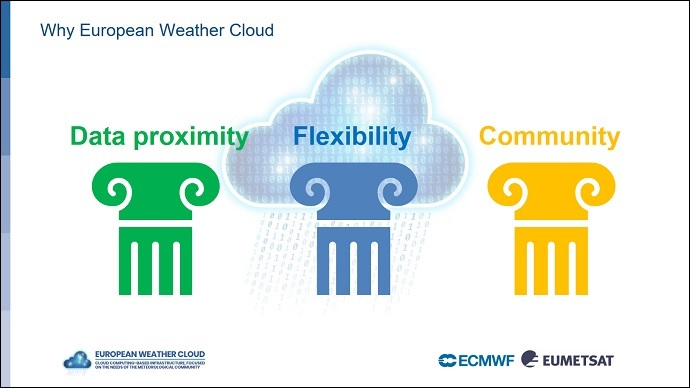
Xavier Abellan and Stig Telfer gave a talk on the European Weather Cloud.
The day also included an expert panel session chaired by Antonio Navarra (University of Bologna). The participants debated the various challenges and opportunities the HPC community faces. This session gave an entertaining insight into the variety of ‘Diversifying HPC’ topics the conference covered over the remaining week.
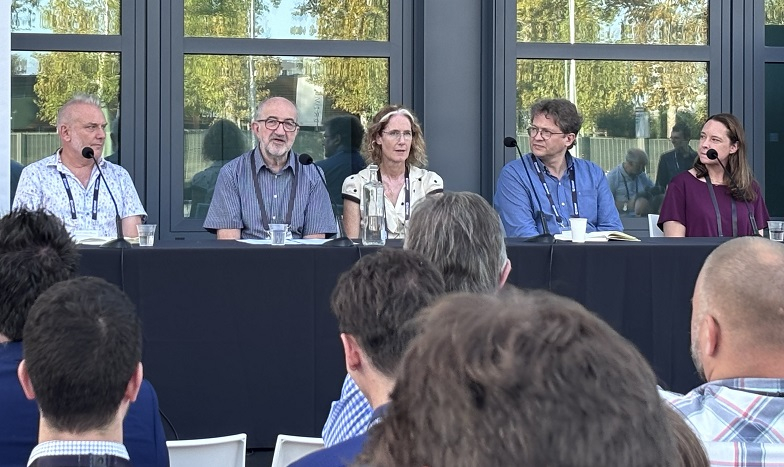
The panel discussion was chaired by Antonio Navarra (second from the left) and included Peter Messmer (NVIDIA) (left), Katherine Evans (Oak Ridge National Laboratory, US) (middle), Utz-Uwe Haus (HPE HPC/AI EMEA Research Lab) (second from the right), and Sheri Mickelson (NCAR, US) (right).
Modular supercomputing and machine learning
Opening the following day, Prof. Estela Suarez (Jülich Supercomputing Centre, Germany) gave a keynote presentation on ‘Modular Supercomputing: enabling application diversity in HPC’.
Modular supercomputers are designed to reflect diverse applications and workloads by designing multiple modules to optimise performance. A modular approach in theory can support the integration of new technologies as these evolve over the lifecycle of a system.
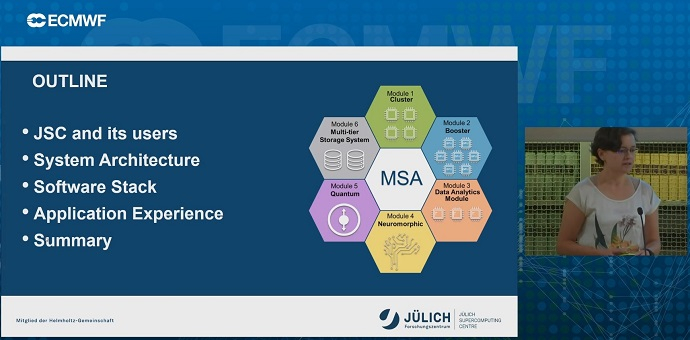
Estela Suarez gave the first keynote presentation.
This was followed by presentations on the EU’s Destination Earth (DestinE) initiative, to which ECMWF contributes. DestinE is developing a novel information system around highly accurate digital twins of our planet.
Mat Chantry (ECMWF) provided an update on machine learning activities at the Centre and some of the developments in accelerating our strategic activities in this field.
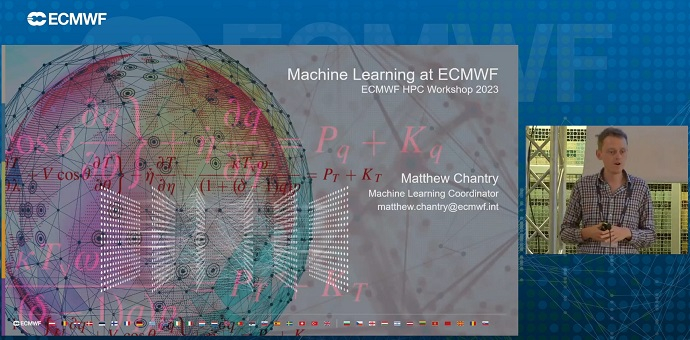
Mat Chantry talked about machine learning at ECMWF.
The afternoon session saw a range of interesting presentations from national meteorological and hydrological services (NMHSs) highlighting service updates and diversification challenges in scaling up to exascale systems to support numerical weather prediction (NWP).
Leveraging diversity and hybrid models
Wednesday started with another insightful keynote talk, by Prof. Katherine Evans (Oak Ridge National Laboratory, US), on leveraging diversity to predict multiscale meteorology. She presented a vision of creating an interactive, robust, flexible and modular computing environment that will address various scientific questions.
The take-home message from Kate’s presentation was the importance of embracing the diversity of tools, capabilities and scientists to make a significant impact.
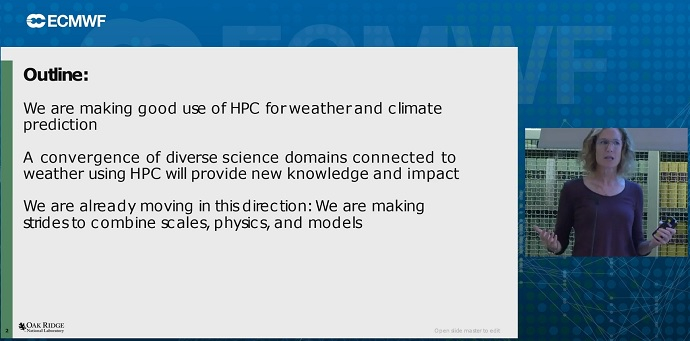
Katherine Evans gave the second keynote presentation.
The diversity theme continued in the following talks, including by Mthetho Sovara (Centre for High Performance Computing, South Africa), who explained that a major investment was being made to translate English HPC terminology into native African languages and working with cultural experts to ensure the appropriate descriptive terminology was used.
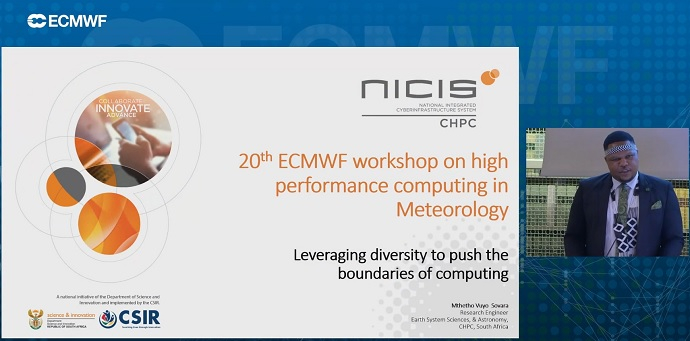
Mthetho Sovara gave a presentation on ‘Leveraging diversity to push the boundaries of computing’.
Subsequent sessions included supplier presentations on advances using technology. There were also updates on code development across meteorological organisations, for example on adapting ECMWF’s Integrated Forecasting System (IFS) to a hybrid CPU–GPU compute model.
Metaprogramming and exploring GT4Py
The final keynote speaker was Prof. Torsten Hoefler (ETH Zurich, Switzerland). In his presentation on Thursday, Torsten explored a number of ways various machine learning (ML) developments could contribute to ‘High-Performance Climate’. He considered the importance of embracing the future of accelerated computation with ‘performance metaprogramming’. This could use machine learning to replace components of the classical workflow.
Pivotal in this model was creating environments to bring together domain specialists with technical experts (‘meta-programmers’). The meta-programmers develop interfaces to abstract some of the complexities of the underlying hardware, simplifying the platforms to enable greater uptake and exploitation by the community.
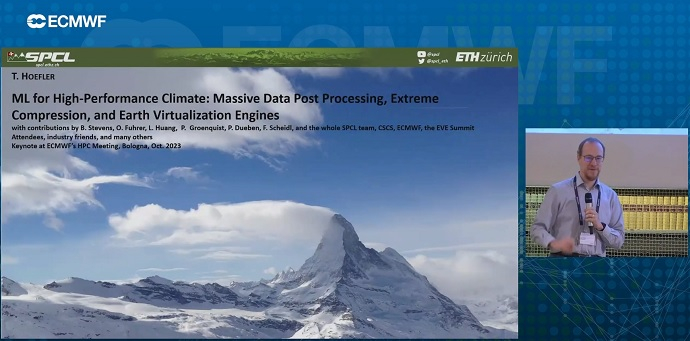
Torsten Hoefler’s presentation was on ‘ML for High-Performance Climate’.
The morning session had a strong cloud theme, exploring optimal usage models for private and public clouds. Preliminary findings appear encouraging, although there is still a large number of unanswered questions around the storage demands associated with cloud instances.
Mike Kiernan (Microsoft Azure) explored diversifying HPC platforms with Azure to support a new era of scientific computing. He emphasised that on-premises and cloud HPC should be complementary services.
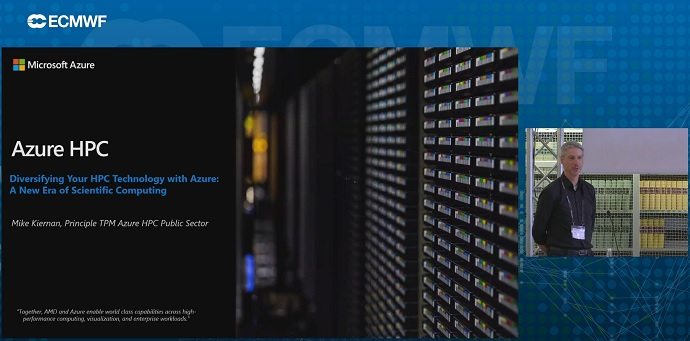
Mike Kiernan gave a talk on ‘Diversifying your HPC technology with Azure’.
Closing the Thursday session were three presentations exploring the Python framework ‘GT4Py’ to support weather and climate application portability. While the diversity of emerging technologies has significant potential to introduce greater numerical resolution and energy efficiency, Earth system modelling also faces an increasingly diverse landscape of supercomputing architectures.
Developments in Japan, China and the US
The Friday morning session was started by Eizi Toyoda (Japan Meteorological Agency). Eizi gave an update on the HPC landscape at his establishment, including the next upgrade scheduled for 2024, which targets a 4x boost in performance compared to the current system.
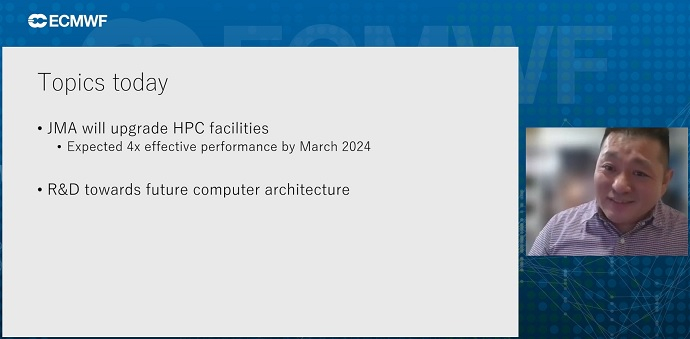
Eizi Toyoda’s presentation was on ‘Updates of HPC in JMA’.
This was followed by talks on the use of GT4Py in NASA's GEOS code and on the Psyclone source-to-source translator for enabling performance portability for weather and climate codes.
The session continued with a presentation from Qingu Jiang (China Meteorological Administration) on the software framework and roadmap for their multi-moment constrained finite volume (MCV) model.
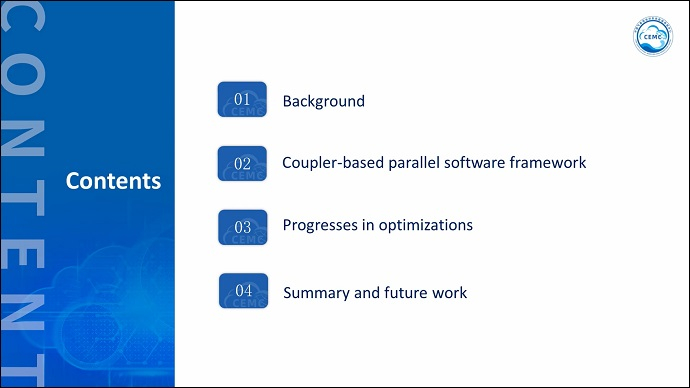
Qingu Jiang gave a talk entitled ‘Parallel software programme of MCV model’.
Other talks were on moving some computations to the storage systems, the WEKA data platform, I/O challenges, a serverless computing paradigm, and a framework for message-driven data routing.
The concluding presentation of the Friday session and of the HPC workshop was given by Sheri Mickelson (National Center for Atmospheric Research, US), who described the EarthWorks programme, which aims to build a storm-resolving modelling system.
A poster session was also held, with 19 presenters available to discuss their topics with the delegates. The posters were shared online in advance, so remote participants could raise any questions directly with the authors via the social wall on the streaming platform.
More information
More information on the workshop is available on our website, all talks can be accessed as slides or videos, and posters are available to view.
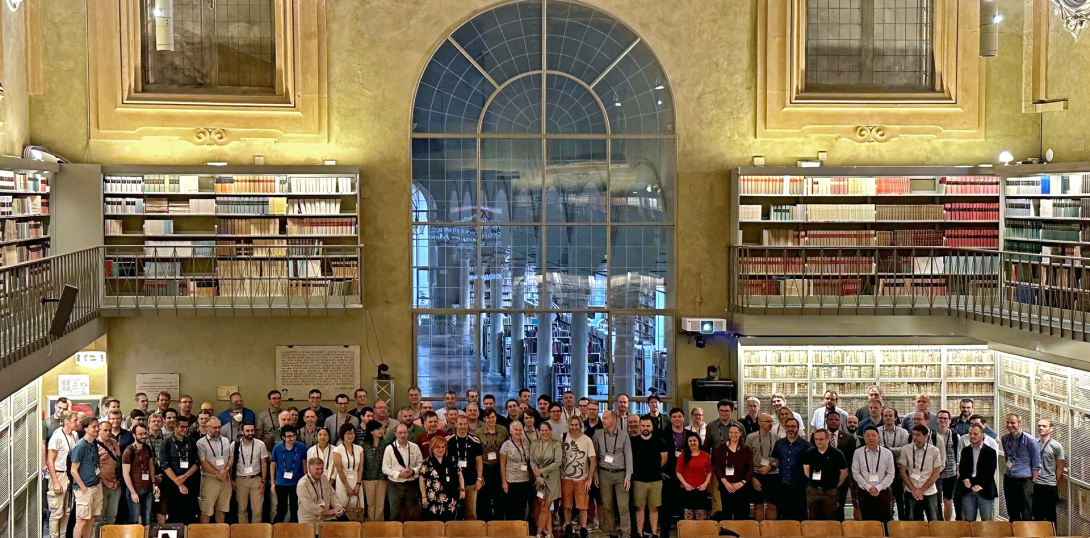
Workshop talks and the poster session took place at the San Domenico conference centre in Bologna.
